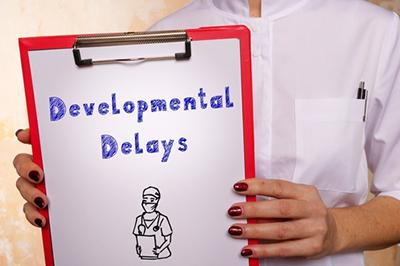Developmental Delay 101: Understanding the Basics and Early Signs

- posted: Jan. 14, 2024
Developmental delays refer to a child's slower progress in acquiring skills from others. These delays can affect various areas, including speech, motor skills, and social interactions. Parents must tune into potential signs, such as difficulty in communication, delays in reaching milestones, or challenges in daily activities.
When faced with concerns about your child's development, seeking expert guidance is essential. Dr. John Vann and Dr. Tricia Schmit at Omaha Childrens Clinic are compassionate and experienced pediatricians dedicated to addressing developmental concerns. They approach each case with a personalized touch, ensuring a thorough evaluation to understand your child's needs.
Visiting Dr. Vann or Dr. Schmit is recommended if you notice a persistent developmental delay in Omaha, NE, or if your instincts as a parent raise concerns. They provide a supportive environment, offering insights into your child's development and potential interventions. Early detection and intervention can significantly improve outcomes, and visiting Omaha Childrens Clinic is essential for nurturing your child's well-being.
Developmental Delay 101: Understanding the Basics and Early Signs
With speech, you may notice delays by age two if a child isn’t using simple phrases or following basic instructions. Motor skill delays could mean difficulty holding objects or walking by 18 months. Social delays might involve avoiding eye contact or not engaging in interactive play by age three.
Early signs often vary depending on the developmental aspect. For example, in communication, you might notice limited babbling or minimal word attempts by 12 months. In motor skills, difficulties crawling, sitting up, or grasping objects by the expected age might signal delays. Socially, if your child doesn’t respond to their name or shows disinterest in playing with peers, it could indicate developmental challenges.
Observing these signs doesn’t necessarily confirm a developmental delay but early identification is vital for intervention. Seeking guidance from pediatricians or developmental specialists can provide clarity and support in addressing potential delays, ensuring your child receives the appropriate assistance for their needs.
When to Visit Our Pediatrician for Developmental Delays
Persistent delays in motor skills, speech, social interaction, or cognitive abilities should prompt an evaluation. Any regression in skills, concerns about sensory issues, or parental instincts indicating something is off warrant a pediatrician visit. Early intervention is vital for addressing developmental delays effectively.
Please explore our website to learn about the conditions we treat and the services provided. Schedule a consultation with specialists like Dr. John Vann or Dr. Tricia Schmit today at Omaha Childrens Clinic, ensuring your child receives an accurate diagnosis for developmental delay in Omaha, NE. To book an appointment, call (402) 330-5690.

- posted: Jan. 14, 2024
Developmental delays refer to a child's slower progress in acquiring skills from others. These delays can affect various areas, including speech, motor skills, and social interactions. Parents must tune into potential signs, such as difficulty in communication, delays in reaching milestones, or challenges in daily activities.
When faced with concerns about your child's development, seeking expert guidance is essential. Dr. John Vann and Dr. Tricia Schmit at Omaha Childrens Clinic are compassionate and experienced pediatricians dedicated to addressing developmental concerns. They approach each case with a personalized touch, ensuring a thorough evaluation to understand your child's needs.
Visiting Dr. Vann or Dr. Schmit is recommended if you notice a persistent developmental delay in Omaha, NE, or if your instincts as a parent raise concerns. They provide a supportive environment, offering insights into your child's development and potential interventions. Early detection and intervention can significantly improve outcomes, and visiting Omaha Childrens Clinic is essential for nurturing your child's well-being.
Developmental Delay 101: Understanding the Basics and Early Signs
With speech, you may notice delays by age two if a child isn’t using simple phrases or following basic instructions. Motor skill delays could mean difficulty holding objects or walking by 18 months. Social delays might involve avoiding eye contact or not engaging in interactive play by age three.
Early signs often vary depending on the developmental aspect. For example, in communication, you might notice limited babbling or minimal word attempts by 12 months. In motor skills, difficulties crawling, sitting up, or grasping objects by the expected age might signal delays. Socially, if your child doesn’t respond to their name or shows disinterest in playing with peers, it could indicate developmental challenges.
Observing these signs doesn’t necessarily confirm a developmental delay but early identification is vital for intervention. Seeking guidance from pediatricians or developmental specialists can provide clarity and support in addressing potential delays, ensuring your child receives the appropriate assistance for their needs.
When to Visit Our Pediatrician for Developmental Delays
Persistent delays in motor skills, speech, social interaction, or cognitive abilities should prompt an evaluation. Any regression in skills, concerns about sensory issues, or parental instincts indicating something is off warrant a pediatrician visit. Early intervention is vital for addressing developmental delays effectively.
Please explore our website to learn about the conditions we treat and the services provided. Schedule a consultation with specialists like Dr. John Vann or Dr. Tricia Schmit today at Omaha Childrens Clinic, ensuring your child receives an accurate diagnosis for developmental delay in Omaha, NE. To book an appointment, call (402) 330-5690.
Our Location
Find us on the map
19102 Q Street, Ste 102
Omaha, NE 68135, United States
